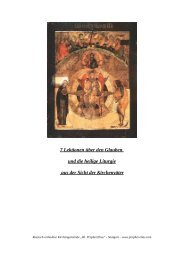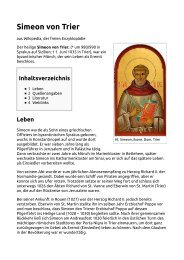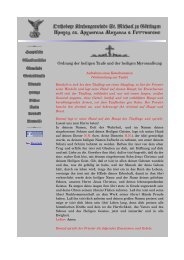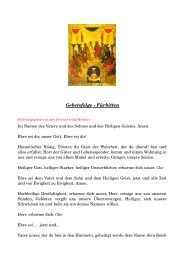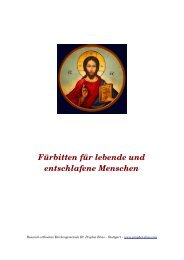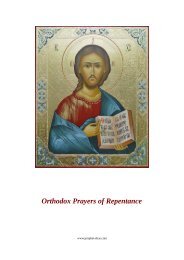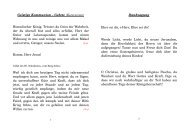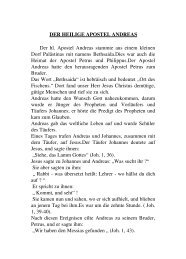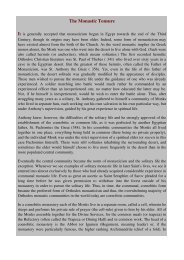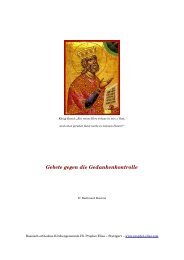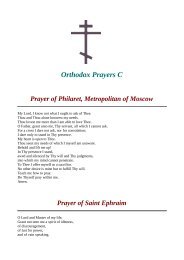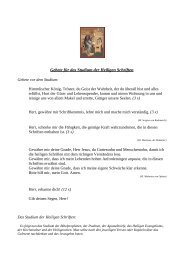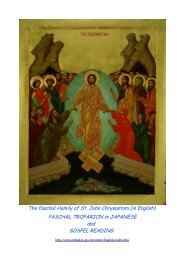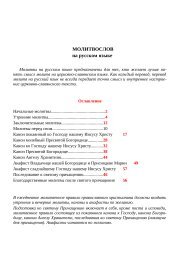The Cell Rule of Five Hundred of the Optina Monastery
The Cell Rule of Five Hundred of the Optina Monastery
The Cell Rule of Five Hundred of the Optina Monastery
Create successful ePaper yourself
Turn your PDF publications into a flip-book with our unique Google optimized e-Paper software.
<strong>The</strong> <strong>Cell</strong> <strong>Rule</strong> <strong>of</strong> <strong>Five</strong> <strong>Hundred</strong> <strong>of</strong> <strong>the</strong><strong>Optina</strong> <strong>Monastery</strong>A Russian Orthodox monastic prayer rule involving <strong>the</strong> JesusPrayer, Psalter, Gospels, and Epistles.In ADDITION to <strong>the</strong> church services: <strong>the</strong> Liturgy, Matins, and Vespers with Compline,which all <strong>of</strong> <strong>the</strong> brethren <strong>of</strong> <strong>the</strong> monastery are obligated to attend, many <strong>of</strong> <strong>the</strong>m dailyread in <strong>the</strong>ir cells:Scripture Reading• One chapter from <strong>the</strong> Gospel in order, beginning first with <strong>the</strong> Gospel <strong>of</strong>Mat<strong>the</strong>w, to <strong>the</strong> last chapter <strong>of</strong> <strong>the</strong> Gospel <strong>of</strong> John,• Two chapters from <strong>the</strong> Epistle, likewise in order, beginning with <strong>the</strong> Acts <strong>of</strong> <strong>the</strong>holy Apostles and ending with <strong>the</strong> last chapter <strong>of</strong> <strong>the</strong> Apocalypse <strong>of</strong> Saint John
<strong>the</strong> <strong>The</strong>ologian. <strong>The</strong> last seven chapters <strong>of</strong> <strong>the</strong> Apocalypse are read one a day.• One kathisma a day <strong>of</strong> <strong>the</strong> Psalter, beginning with <strong>the</strong> first and ending with <strong>the</strong>last.In this way <strong>the</strong> last chapter <strong>of</strong> <strong>the</strong> Apocalypse is read on exactly <strong>the</strong> same day as <strong>the</strong>last chapter <strong>of</strong> <strong>the</strong> Gospel <strong>of</strong> John.<strong>The</strong>n, after <strong>the</strong> completion <strong>of</strong> <strong>the</strong> reading <strong>of</strong> <strong>the</strong> whole New Testament, in this manner<strong>the</strong>y begin again from <strong>the</strong> first chapters a new cycle <strong>of</strong> reading in precisely <strong>the</strong> sameorder.In addition to this, <strong>the</strong>y perform <strong>the</strong> socalled:<strong>Cell</strong> <strong>Rule</strong> <strong>of</strong> <strong>Five</strong> <strong>Hundred</strong>It is begun with <strong>the</strong> customary three prostrations performed at <strong>the</strong> commencement <strong>of</strong>every rule <strong>of</strong> prayer, both in church and in one's cell, with <strong>the</strong> prayers:1. God, be merciful to me a sinner.2. God be gracious unto my sins and have mercy on me.3. O Thou Who hast fashioned me, Lord, have mercy. I have sinned beyondmeasure, O Lord, forgive me.4. In one's cell a fourth prostration is added toge<strong>the</strong>r with <strong>the</strong> prayer: My Lady,Most Holy <strong>The</strong>otokos, save me a sinner.<strong>The</strong>n <strong>the</strong> following prayers are said:Through <strong>the</strong> Prayers <strong>of</strong> our holy Fa<strong>the</strong>rs, Lord Jesus Christ our God, have mercy onus. Amen.Glory to <strong>The</strong>e, our God, glory to <strong>The</strong>e. O Heavenly King. Holy God (3). Glory. BothNow. Amen.All Holy Trinity. Lord, have mercy (3). Glory. Both Now. Amen.Our Fa<strong>the</strong>r.Through <strong>the</strong> prayers <strong>of</strong> our holy Fa<strong>the</strong>rs, Lord Jesus Christ our God, have mercy on us.Amen.Lord, have mercy (12). Glory. Both Now. Amen.O come, let us worship God our King.O come, let us worship and fall down before Christ our King and God.O come, let us worship and fall down before Him, Christ <strong>the</strong> King and our God.Psalm 50.Symbol <strong>of</strong> Faith.First group.<strong>The</strong>n one hundred prayers: Lord Jesus Christ, Son <strong>of</strong> God, have mercy on me asinner,
• with full prostrations for <strong>the</strong> first ten prayers,• full bows for <strong>the</strong> next twenty prayers,• and on <strong>the</strong> last, that is, <strong>the</strong> hundredth prayer, again a full prostration.After this, <strong>the</strong> following Prayer to <strong>the</strong> Most Holy <strong>The</strong>otokos:My Most Holy Lady <strong>The</strong>otokos, by thy holy and allpowerful entreaties dispel from me,thy humble, wretched servant, despondency, forgetfulness, folly, carelessness, and allimpure, evil, and blasphemous thoughts out <strong>of</strong> my wretched heart and my darkenedmind. And quench <strong>the</strong> flame <strong>of</strong> my passions, for I am poor and wretched, and deliverme from my many cruel memories and deeds, and free me from all evil actions: forblessed art thou by all generations, and glorified is thy most honourable name unto<strong>the</strong> ages <strong>of</strong> ages. Amen.At <strong>the</strong> end <strong>of</strong> this prayer a full prostration.Second group.<strong>The</strong>n again one hundred Jesus Prayers in <strong>the</strong> same order as before with ten fullprostrations and twenty full bows. On <strong>the</strong> last Jesus Prayer a full prostration andagain <strong>the</strong> same prayer: My Most Holy Lady <strong>The</strong>otokos, with a full prostration.Third group.One hundred likewise as <strong>the</strong> first and second.Fourth group.One hundred consisting <strong>of</strong> prayers to <strong>the</strong> Most Holy <strong>The</strong>otokos: My Most Holy Lady<strong>The</strong>otokos, save me a sinner.In this group <strong>of</strong> one hundred• <strong>the</strong> first ten prayers are likewise made with full prostrations• and <strong>the</strong> following twenty with full bows,• <strong>the</strong> remaining without bows.• <strong>The</strong> last and hundredth prayer is made with a full prostration, after which witha full prostration <strong>the</strong> prayer: My Most Holy Lady <strong>The</strong>otokos.<strong>The</strong>n fifty prayers: O Holy Angel <strong>of</strong> God, my Guardian, pray to God for me asinner.• On <strong>the</strong> first five prayers, full prostrations;• on <strong>the</strong> following ten, full bows;• <strong>the</strong> remaining thirtyfour, without bows.• Only on <strong>the</strong> last prayer a full prostration and again <strong>the</strong> prayer: My Most HolyLady <strong>The</strong>otokos, with a full prostration.<strong>The</strong>n fifty prayers: All Saints, pray to God for me a sinner.• On <strong>the</strong> first five prayers, full prostrations;• on <strong>the</strong> following ten, full bows;
<strong>The</strong>n:• <strong>the</strong> remaining thirtyfour, without bows.• Again <strong>the</strong> last prayer with a full prostration, after which is said <strong>the</strong> prayer: MyMost Holy Lady <strong>The</strong>otokos, with a full prostration.It is truly meet to call <strong>the</strong>e blessed, <strong>the</strong> <strong>The</strong>otokos, <strong>the</strong> everblessed and allimmaculateand Mo<strong>the</strong>r <strong>of</strong> our God. More honourable than <strong>the</strong> Cherubim, and beyondcompare more glorious than <strong>the</strong> Seraphim, <strong>the</strong>e who without corruption gayest birth toGod <strong>the</strong> Word,<strong>the</strong> very <strong>The</strong>otokos, <strong>the</strong>e do we magnify.At <strong>the</strong> end <strong>of</strong> this prayer a full prostration.After this:Glory to <strong>The</strong>e, Christ God, our Hope, glory be to <strong>The</strong>e.Glory. Both now.Lord, have mercy (3)Through <strong>the</strong> prayers <strong>of</strong> our Holy Fa<strong>the</strong>rs, Lord Jesus Christ our God, have mercy onus. Amen.On weekdays all <strong>of</strong> <strong>the</strong> abovementioned bows and prostrations are performed.• On <strong>the</strong> days <strong>of</strong> Pentecost,• on days when <strong>the</strong>re is <strong>the</strong> Polyeleos,• on Forefeasts and for <strong>the</strong> duration <strong>of</strong> <strong>the</strong> Feasts,• on days when <strong>the</strong> Great Doxology is chanted at Matins• and in <strong>the</strong> church services full prostrations are dispensed with,in like manner in one's cell <strong>the</strong> full prostrations are replaced with full bows, as is also<strong>the</strong> case on all days throughout <strong>the</strong> year when <strong>the</strong>re is a Vigil.• On <strong>the</strong> last two days <strong>of</strong> Passion Week,• for all <strong>of</strong> Bright Week,• and from <strong>the</strong> twentyfourth <strong>of</strong> December until <strong>the</strong> seventh <strong>of</strong> January,this cell rule is completely dispensed with, as is likewise <strong>the</strong> case on all Sundaysthroughout <strong>the</strong> year, even if <strong>the</strong> allnight Vigil has not been performed, but onlyVespers and Matins, as is done in winter.Any change in <strong>the</strong> composition <strong>of</strong> this cell rule, as well as deduction from it or additionto it, is left to <strong>the</strong> will and blessing <strong>of</strong> <strong>the</strong> Elder or Spiritual Fa<strong>the</strong>r <strong>of</strong> <strong>the</strong> individual.



